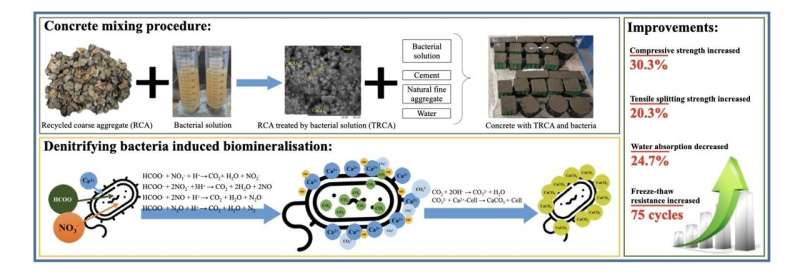Researchers use bacteria to enhance concrete resistance

Concrete, with its low cost, good compressive strength, and manufacturing convenience, is one of the most widely used materials in construction. However, with accelerating urbanization, natural aggregates for mixing with concrete, such as sand and gravel, are in short supply.
Although recycled substances can replace the natural mixture to produce recycled coarse aggregate concrete (RCAC), they may cause various problems—especially in cold regions, daily freeze-thaw cycles can damage concrete, leading to safety issues.
In a paper recently published in the Journal of Cleaner Production, researchers at Xi'an Jiaotong-Liverpool University's Department of Civil Engineering applied denitrifying bacteria to recycled coarse aggregate (RCA) and enhanced the concrete's strength and durability. The treated RCAC can withstand 225 freeze-thaw cycles, which is 75 more than those without treatment, making it suitable for widespread usage in cold areas.
Traditional methods
Professor Chee Seong Chin, the corresponding author of the paper, says the traditional ways to improve concrete's freeze-thaw resistance are unsustainable in the long term.
"These methods, such as reducing the water-cement ratio and increasing the chemical admixtures, increase the usage of chemical substances, leaving adverse impacts on sustainability. In comparison, we offer an environmentally friendly solution. Our method uses denitrifying bacteria and doesn't contain or create poisonous or polluting substances," he says.
A decrease in water absorption
Reducing water absorption is crucial to enhancing RCAC's freeze-thaw resistance, explains Professor Chin.
During freeze-thaw cycles, water penetrates the concrete, creating cracks in the structure, and reducing its durability. When the water freezes, it expands. The more water, the more swelling, and the more swelling, the more damage.
"If not treated by bacteria, using RCA in concrete can increase water absorption due to its loose structure and high porosity, whereas denitrifying bacteria can block the holes where water gets in, effectively reducing the free water absorbed inside the concrete by 33%. It prevents the water absorption from outside, thus reducing the swelling from inside," he says.
A steadier structure
In addition, bacteria can also improve the capacity of concrete to resist water-freezing expansion by creating a steadier structure, says Professor Chin.
"The voids and pores of RCAC are filled with calcium carbonate crystals created by bacteria, making the structure denser and decreasing the expansion effect of frozen water. Based on our experiment, denitrifying bacteria can improve the compressive strength and tensile splitting strength by 30.3% and 20.3%, respectively. Moreover, bacteria consume excess calcium hydroxide during the biomineralization process, making the concrete more frost-resistant. Calcium hydroxide between aggregates and the cement matrix are generally considered negative factors in terms of strength and durability," he says.
Although this novel method has significantly increased the freeze-thaw resistance of RCAC, further research is needed to enhance the resistance by using nanomaterials or other cementitious materials with bio-mineralization methods, says Professor Chin.
"Future research needs to investigate the economic cost and quantify the environmental impact with a life-cycle assessment," he adds.
More information: Zuowei Liu et al, Novel method for enhancing freeze–thaw resistance of recycled coarse aggregate concrete via two-stage introduction of denitrifying bacteria, Journal of Cleaner Production (2022). DOI: 10.1016/j.jclepro.2022.131159
Journal information: Journal of Cleaner Production
Provided by Xi'an jiaotong-Liverpool University




















